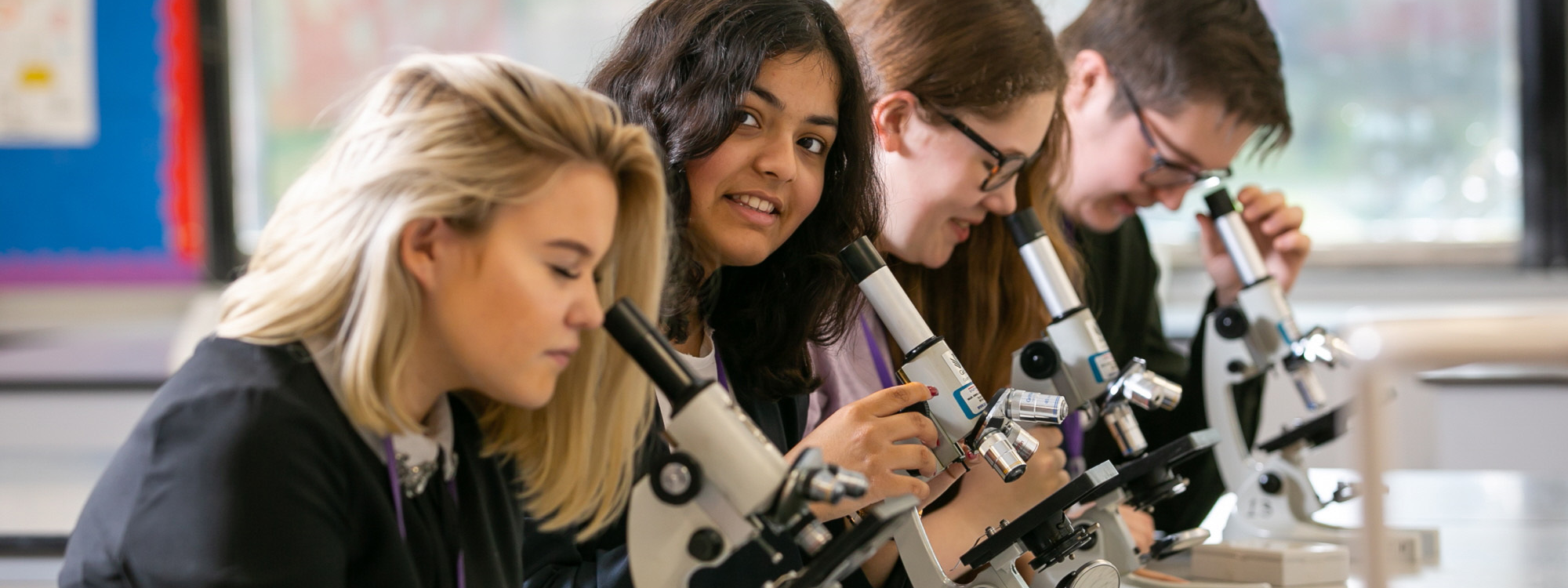Science - Biology
Back to Subjects MenuWhat is it to be a Biologist at BCHS?
Being a Biologist is about understanding living things; how they work, how they have adapted and evolved, how we interact with other organisms and how we as a species affect the world around us.
You will handle living material and observe as well as perform dissections to investigate the inner workings of living things. You will take part in laboratory and field investigations and will use these to develop an understanding of biological molecules, cells, genetic information, relationships between organisms and many other topics.
KS4 Overview
Year 9 overview
In year 9 you will begin your study of the GCSE Biology topics. Across the year you will learn about:
- Cell structure and transport
- How the human body and plants are organised
- How we digest foods
- Non-communicable diseases.
- Communicable diseases and how we treat and prevent disease
- How drugs are developed.
- Photosynthesis and respiration
This covers the whole of the content needed for the first GCSE Biology paper
Year 10 overview
In year 10 you will learn about the topics needed for paper two of the Biology GCSE paper.
This includes:
- Hormones and the nervous system
- Human reproduction
- Genetics and inheritance
- Adaption and evolution
- Ecosystem and Biodiversity
Year 11 overview
Year 11 with focus on developing mastery of the topics from years 9 and 10. Students will focus on her level understanding and an application of knowledge different scenarios within exam style questions.
Students will repeat required practical experiments and look into different ways of completing these, honing practical and maths skills while linking Biology theory to each experiment.
Subject Overview - Sixth Form
Year 12 overview
Year 12 will cover the first four topics of the course, outlined below:
- Biological molecule
- Cells
- Organisms exchange substances with their environment
- Genetic information, variation and relationships between organisms
You will also need to complete some of the required practical experiments across the year.
Year 13 overview
In year 13 you will cover topics 5 – 8, you will be assessed on all eight topics.
- Energy transfers in and between organisms
- Organisms respond to changes in their internal and external environments
- Genetics, populations, evolution and ecosystems
- The control of gene expression
You will also have completed all of the 12 required practical experiments.
Enrichment
Throughout key stage 4 Biology students will have opportunities to develop their Biology knowledge further through enrichment. The department run a trip to Gunther Von Hagen’s Bodyworlds Museum in London. Which lets students see the inner workings of animals and humans from real life bodies that have been preserved and dissected.
The Royal Society of Biology holds a Biology week, during which we hold competitions and activities for students to take part in.
Students are encouraged through homework and tasks to get out into their surroundings and develop their understanding of ecology.
Throughout key stage 5 Biology students will have opportunities to develop their Biology knowledge further through enrichment. The department run a trip to Gunther Von Hagen’s Bodyworlds Museum in London. Which lets students see the inner workings of animals and humans from real life bodies that have been preserved and dissected.
Students are expected to go on a weeklong field trip to North Wales, where they get hands on experience of Biological investigation. Such subject material in the field can considerably enhance student’s knowledge and understanding of the key issues assessed at higher level. The fieldtrip will enable students to undertake the necessary primary data collection for the completion of the required units of the curriculum.
How do we contribute to PHSEE, British Values and SMSC?
Students learn about the importance of lifestyle and the effects that poor diet, exercise routine and social habits can have on the physiology of the body.
Student will debate the ethical issues concerning biological research, whereby they will need to consider the opinions and religions of others to come up with a valid evaluation and conclusion.
Students will get an insight into the impact that the human race has on other organisms and the ecosystem around us, which will spark debate about our role in developing a more sustainable way of living on a larger scale.
Students will also discuss genetics and the alteration of gene expression. Students will need to consider any ethical issues surrounding this area of study.
What careers does Biology support?
The major fields of employment include Agriculture, Education, Forestry, Horticulture, Industry (food processing, brewing, pest control, and pharmaceuticals), Medical Research, Nature Conservancy, Radiobiology and Scientific Civil Service.
Students intending to take up careers in medicine, food science, veterinary science, nursing, farming and horticulture would need to study Biology.
The subject also has links with Physical Education and therefore would support careers in physiotherapy, sports science, sports coaching and sports rehabilitation.




